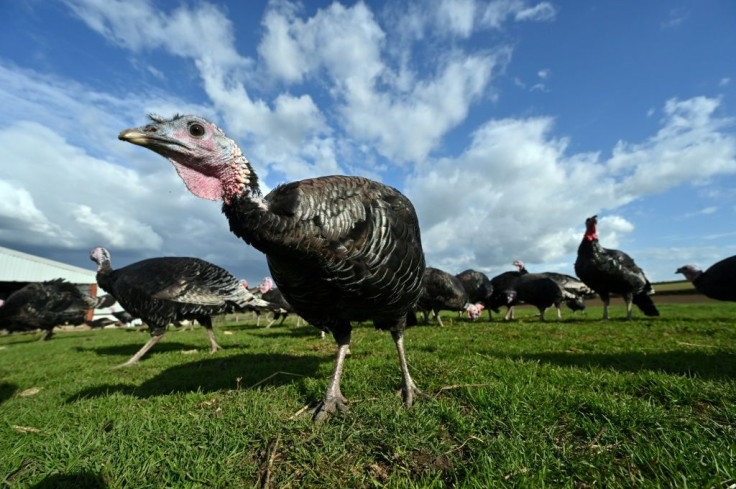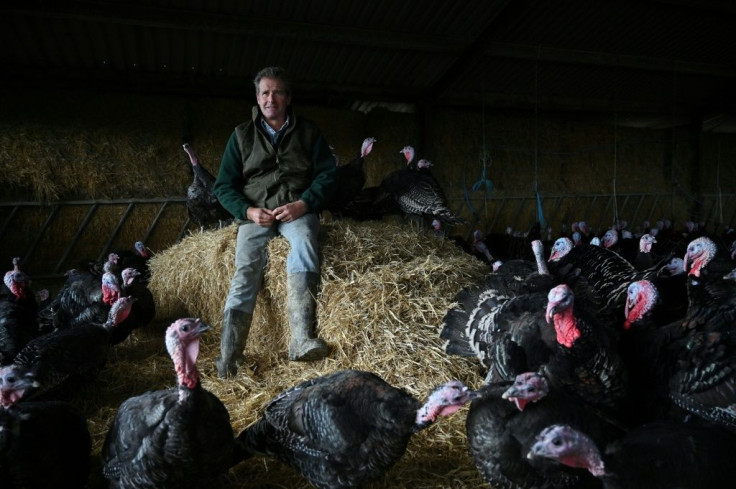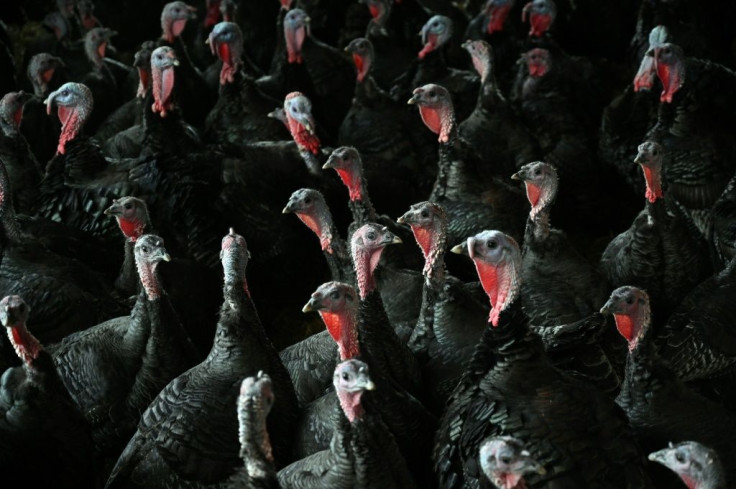UK Families Gobble Up Teenier Turkeys For Covid Christmas
Squabbling over a treat of apples in autumnal sunshine, Mark Chilcott's feisty turkeys look pretty hefty. In fact, they're a smaller breed destined for downsized family dinners this Covid Christmas.
Chilcott, a 58-year-old organic farmer, prizes quality over quantity at his mixed farm of 440 acres (180 hectares) in Dorset, southwest England.
In the spring, as the coronavirus pandemic took hold, he anticipated no let-up to government curbs on how many people can mix indoors through the end of the year.
So he opted in April for smaller hatchlings from the "bronze" breed of turkey, favouring hens over the larger male stags, and a shrunken flock of 1,200 birds compared to the 1,500 he reared last year.

The hens will reach about 5-6 kilograms (11-13 pounds) in weight -- half that of bronze stags, and one-third of the supersized supermarket turkeys which are the centrepiece for traditional British Christmas meals.
Chilcott says that is still plenty for a gathering under the government's "rule of six" in parts of England where households are still allowed to mix.
Restrictions are fast evolving, and many more families will likely be forbidden any visitors by December if infection rates remain high or rise further.
"If we run out of small sizes, then people have to have crowns or joints or half turkeys," the farmer told AFP after tossing fruit to his raucous black flock, a change on their usual diet of grain pellets.

"But we expect to sell out easily this year. Demand's really quite good... as far as sales go, we're ahead of last year."
Other farmers who took the wrong bet, hoping for restrictions to relax by the festive season, risk being saddled with oversized turkeys that could leave smaller family groups bloated with post-Yule curries and sandwiches.
British Poultry Council chief executive Richard Griffiths recommends those suppliers slaughter and freeze their birds earlier, before they have grown to full size.

Many farmers have already been making the switch as Britons turn away from frozen turkeys sourced from battery farms to smaller free-range ones, or opt for a more traditional goose, according to the industry council.
But keen to see demand hold up on last year's sales of nine million turkeys, Griffiths advised: "If people can't get together in large families then it might be worth taking what's available -- even slightly larger birds -- rather than missing out."
Farmers can do their best to adapt, but some things can't be helped in the middle of a pandemic.
Customers at the Chilcott farm will miss out this year on the customary mince pie and glass of mulled cider when they come to pick up their pre-ordered turkeys.
Social distancing means they must stay in their car while Chilcott, his wife or two children load their boxed order into the boot.
The family, including Chilcott's parents who started the farm in the 1960s, will be working "right to the last minute" to fulfil orders before settling down to their own roast on Christmas Day.
After that, there could be a fraught few days leading up to the industry's next big deadline: January 1, when Britain could well be embarking on a "no deal" divorce from the European Union.
Some British farmers are keen to escape the EU's Common Agricultural Policy, which they see as environmentally disastrous and rigged in favour of continental rivals.
But Griffiths said the poultry industry is concerned about the consequences of no-deal on "just in time" deliveries across borders of eggs, newborn chicks and fresh birds.
Chilcott faces a bigger challenge from the possibility of a UK-US free trade deal in the aftermath of Brexit, if it entails stiffer competition from hormone-fed or chlorine-washed US fowl.
For now, he is pleased that his punt on petite poultry is paying off.





















